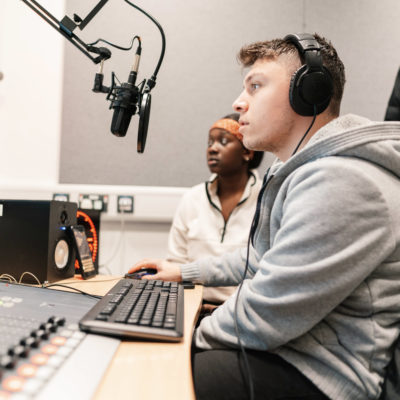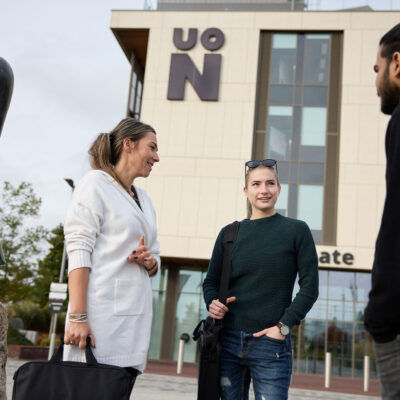
Anthony Stepniak
Senior Lecturer in Media & Cultural Theory
Faculty of Arts, Science and Technology
DiscoverGet in touch with us as we may be able to offer you a place for September 2024 through Clearing.
UCAS Code
BA: P390
BA with Foundation: P391
Level
UndergraduateUG
BA (Hons)Duration
Full Time: 3 years
Full Time Foundation: 4 years
Part Time: 4 - 6 years
Starting
September
BCC at A-Level or
DMM at BTEC
Fees UK 24/25
Full Time: £9,250
Part Time: £1,540 per 20 credit module
Integrated Foundation Year: £9,250
Fees International 24/25
Full Time: £15,200
Integrated Foundation Year: £15,200
Location
For questions regarding study and admissions please contact us:
Our Creative Film, Television and Digital Media Production BA degree is designed to prepare you to play an integral role in the digital media and wider creative industries through the experience you will gain and the portfolio of work you will produce. The film production course includes a series of practice-based models including short film, TV studio broadcasting, documentary-making and creative video production. Students will then gain wider knowledge of the industry etiquettes and inner workings of the contemporary media industry in a host of theoretical modules.
On the media production degree, you will develop production skills in editing, directing, script writing, camera work and sound as well as sector-based skills around networking, portfolio-building and pitching ideas. We offer opportunities for students to engage in live client-based productions, enabling them to build on skills, understanding and experience to enhance their employability and enable them to develop as independent and informed creative professionals. You will also have an opportunity to produce work for clients, undertake work experience, produce a major media project or develop a script for potential funding.
Our Creative Film, Television and Digital Media Production BA course is Industry Accredited by JAMES representing APRS, MPG and associate industry bodies. Accreditation of a course by relevant industry bodies provides assurance to students and employers of its potential and value.

Updated 03/07/2024





This digital media production course has been designed to contribute towards achieving the following United Nations Sustainable Development Goals:
SDG11: Sustainable Cities and Communities
The Creative Film, Television and Digital Media Production BA degree is designed to offer you a choice of career paths. You will start by studying a broad range of media, before specialising in your desired area of interest over the final two years, which will involve learning how to critically analyse your own work. Although there is a practical emphasis for this film and TV course, you will also learn critical analysis of contemporary theories and approaches to media forms, audiences and industries.
Studies focus on how media content is conceptually conceived, technically produced, edited, distributed and disseminated. Throughout the course, your knowledge of media production, its practices and processes, will grow through learning experiences where creative, technical and professional skills are developed in different contexts and environments.
Whilst learning the values of traditional craft skills are crucial, so is the ability to recognise the potential opportunities offered by new and emerging technologies. The creative film course will encourage you to be aware of these.
The material produced on the degree will be diverse, varying from short films to documentary dramas – much of which will be distributed through the Internet. To enhance this sense of realism many of your modules will require you to fulfill briefs to deadlines; some of these will be assessed, some will just need to be completed. Projects, especially in the third year, may come direct from organisations requiring media content or productions. These ‘live briefs’ may be requests to produce a multimedia website, make a documentary film or simply record, in a variety of ways, a particular event.
Please note the modules shown here relate to the academic year 24/25. The modules relating to the academic year 25/26 will be available from June 2025.
A typical offer for Creative Film, Television and Digital Media Production BA would be:
We welcome international applications and applications from students with a range of non-traditional educational or professional qualifications, and also applications from students with a mix of A levels and BTEC/Cambridge Technical qualification.
For more information on how to make an application, please visit our How to Apply page.
If you are an International student and would like information on making an application, please see our How to Apply page.
Admission to this foundation programme is normally:
However, we would also like to hear from you if you have professional or industry experience instead, a range of other qualifications or self-developed subject knowledge that relates to the programme you wish to study.
All International and EU students applying for a course with us must meet the following minimum English language requirements:
For information regarding English language requirements at the University, please see our IELTS page.
Fees quoted for the digital media production degree relate to study in the Academic Year 24/25 only and may be subject to inflationary increases in future years.
Optional
You may find it useful to set up a subscription to Adobe Creative Cloud. This will give you access to creative tools at home and costs £15 per month.
Fees quoted relate to study in the Academic Year 23/24 only and may be subject to inflationary increases in future years.
Optional
You may find it useful to set up a subscription to Adobe Creative Cloud. This will give you access to creative tools at home and costs £15 per month.
For information on the scholarships available to you, please see our scholarships page.
For more information about possible funding options, please visit our Fees and Funding pages.
At the University of Northampton, everything we do, from funded trips to paid internships, is to give you everything you need to make a difference when you leave.
If you join this full time digital media production degree at the University of Northampton, you will receive a laptop when your course begins*. The laptops are built to a bespoke custom specification ideal for use in the seminar room, collaborative group work or studying at home.
Whatever your ambitions, we’re here to help you to achieve them. We’ll support you to identify the skills you’re learning during your course, find your strengths and secure practical experience so that when it comes to applying for jobs or further study you’ll feel confident in standing out from the crowd. We’ve created the Northampton Employment Promise because we are so confident that if you focus on your studies and complete one of our awards you’ll be highly employable by the time you graduate. Putting you in a great position to secure employment or continue your studies.
To check out the full list of perks, visit our Student Perks page or dedicated International Perks page.
*UK fee payers only (see Terms and Conditions for further details).
The Integrated Foundation Year (IFY) offers a new and exciting route into studying for a TV and Digital Media Production degree, attracting ambitious and driven students who are willing to learn and advance.
If you have non-standard qualifications or do not quite meet the admissions requirements we can offer you a fantastic opportunity to study a four year programme which includes an Integrated Foundation Year. The Integrated Foundation Year will help you develop the theoretical/practical and academic skills you need, in order to successfully progress to the full award.
Our four-year courses will enable you to successfully follow the degree pathway of your choice while gaining essential study skills. The foundation year of your chosen degree will be studied on a full-time basis and is aimed at supporting the transition to higher education. Years two, three and four are then studied as a standard degree programme.
For this course, your taught study will be a combination of lectures, seminars and workshops, both face to face and online through blended learning, for at least 12 contact hours per week. We recommend you also spend at least 12 hours per week in self-directed study time.
Find out more about Creative Film, Television and Digital Media Production BA at UON:
You will be assessed through practical projects, essays and other written assignments, seminar presentations, pitches, and some examinations.
Our annual Changing Futures Week is an exciting event and an excellent opportunity for our students to explore the potential of their course and understand where their university experience can lead them beyond graduation. It offers a unique chance to network with high profile industry professionals from the arts, TV, film, fashion and more.
Senior Lecturer in Media & Cultural Theory
Faculty of Arts, Science and Technology
DiscoverSenior Lecturer in Media Production
Faculty of Arts, Science and Technology
DiscoverSenior Lecturer in Media Production
Faculty of Arts, Science and Technology
DiscoverSenior Lecturer in Journalism & Media
Faculty of Arts, Science and Technology
DiscoverLecturer in Screen Studies
Creative Film, Television and Digital Media Production BA (Hons)
DiscoverThis Creative Film Television and Digital Media Production course will open up a range of career opportunities, including:
Specialist facilities include:

Multimedia Journalism BA will provide you with the skills and knowledge you need for a career in journalism be it in print, online or in radio and television.

Film and Screen Studies is a dynamic programme that allows you to explore the narrative, artistic, cultural, economic, and political implications of a wide range of media.


